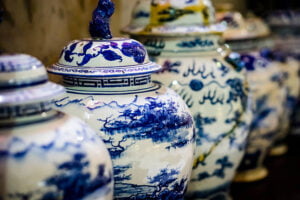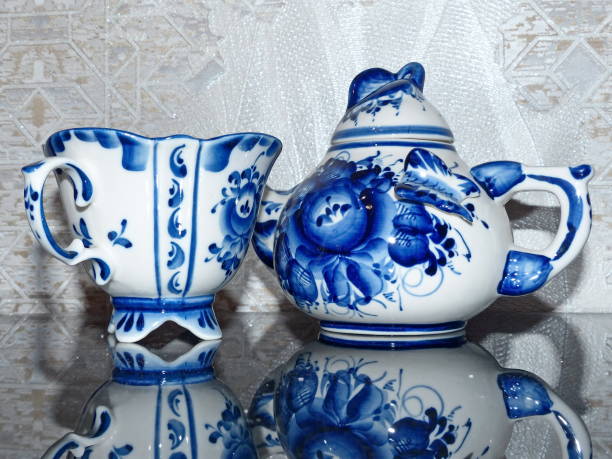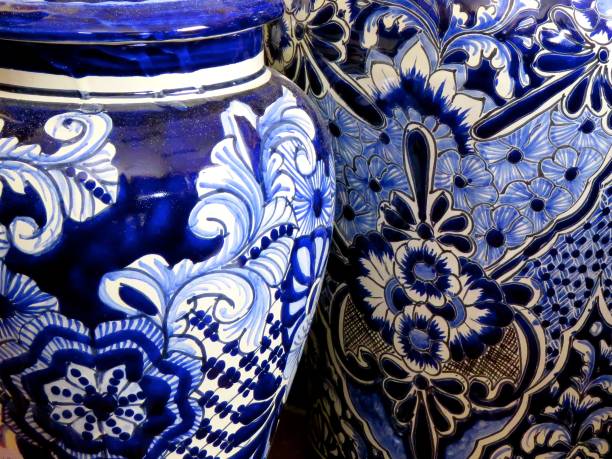The Mysterious Effect of Blue in Home Decor: Blue Vase with Chinoiserie
Color in home décor affects mood and mental health. Interiors often feature blue, especially in ginger jars and Chinoiserie vases. These pieces are beautiful and add to a space’s calmness.

Blue, connected with the sky and water, calms and relaxes. The capacity to decrease stress and inspire is well known. Blue elements in home décor can create a relaxing atmosphere. This applies especially to relaxing living areas.
With their elaborate patterns and blue color, Chinoiserie vases offer visual richness and cultural depth. Western decoration has been influenced by Chinese and East Asian art and design since the 17th century. Blue and white vases with landscapes, floral patterns, or figures are typical. The blue in these vases is generally a deep, bright cobalt. Its depth and intensity make this blue stand out in any area.
Blue’s psychological impacts on home décor depend on its colors. Light blues provide a relaxing ambiance and make a room feel bigger. Darker colors like blue or cobalt provide refinement and drama without overpowering. They promote stability and security.
Add a blue vase or Chinoiserie pottery to a room to change its atmosphere. In a living area, a vast blue vase can anchor the décor. Fresh flowers or green plants add natural ingredients that reduce stress and improve mental health.
Blue accents can improve room functionality when placed strategically. Blue works well in a study or home office. Blue symbolizes clarity and focus, which is excellent for concentration regions. Blue vases can enhance the room’s productivity while adding visual appeal.
Softer blues can also provide a relaxing atmosphere in bedrooms. A bedside Chinoiserie vase and gentle, pleasant lighting can help you sleep and relax.
Blue complements many design styles, demonstrating its adaptability. Blue is versatile and appealing, whether in a modern minimalist home where a blue vase stands out against a neutral background or in a more traditional setting where many hues of blue create a layered and textured look.
Cultural factors also influence blue in-house décor. In many civilizations, blue symbolizes serenity, knowledge, and safety, and blue vases are decorative and symbolic due to their cultural significance. Due to their cultural significance, blue vases may spark conversations and communicate a story through home design.
Investigate how blue might be used in different home settings, from the psychological to the practical. In smaller places, lighter blues can make them feel bigger. Bold blue accents can define zones and establish visual markers in more significant, open spaces.
When using blue in home decor, consider aesthetic and psychological considerations. The perfect shade of blue and ornamental pieces, such as a Chinoiserie vase or a striking blue jar, can alter a space visually and emotionally, improving its inhabitants’ quality of life.
Blue has a substantial impact on house mood and atmosphere. A balance of beauty and tranquility can be achieved by carefully selecting and installing blue decorative pieces like vases and Chinoiserie pottery to improve the physical space and psychological comfort of those within it.
Western Chinoiserie: East Meets West in Home Decor
For ages, Western décor has been influenced by Chinoiserie, which imitates Chinese and East Asian art. Since the 17th century, this style has gone through many popularity and adaptation stages. Ginger jars and Chinoiserie vases, which have graced the mantels and tables of many Western houses, offer a look into the East’s mysticism and exoticism.
Orientalism, which took inspiration from Ottoman, Persian, and East Asian art and culture, brought chinoiserie to the West. The style was favored during the Rococo period when its elaborate and whimsical designs matched extravagant furniture and tapestries. European potters initially imitated blue and white porcelain vases with complex landscapes and peaceful themes of Chinese life. They are still popular today.
These things are fascinating for their exotic appeal and meticulous craftsmanship. The vivid cobalt blue on a white porcelain background draws attention and makes a statement in any room. These works were regularly displayed in significant European residences to symbolize affluence and a global viewpoint, a practice that continues today with a different context.
Chinoiserie’s blue vases and ginger jars influenced local craftsmanship as they entered Western houses. European artisans copied these designs and added their touches or local styles, producing a unique blend of Eastern and Western art. However complicated by authenticity and appropriation, this cultural interaction produced a rich body of work that shaped European decorative art.
Chinoiserie remains popular today. Its timeless charm and versatility are often seen in home design trends. Modern designers merge traditional and contemporary features with Chinoiserie vases to create vivid, dynamic interiors. Once emblems of luxury or exoticism, these things are now part of worldwide artistic history that promotes openness and diversity.
Modern interior designers typically base a room’s style on the blue Chinoiserie vase. Chinoiserie vases look great in minimalist or boho settings, as they stand out against neutral backgrounds or vibrant textiles and textures. Its timeless beauty and ability to integrate into various decors demonstrate its worldwide appeal.
The West’s Chinoiserie conversation also addresses cultural interaction and ethics. While 18th-century Orientalism bordered on fantasy, modern appreciation emphasizes respect and gratitude rather than imitation. Contemporary designers are more conscious of these things’ cultural significance and attempt to incorporate them into modern décor while honoring their origins and craftsmanship.
This move from exotic novelty to treasured artifact illustrates Western societies’ changing relationship with non-Western art. It represents a rising regard for cultural heritage and history by appreciating the talent and artistic vision of non-Western artisans who created products that intrigued European collectors.
Chinoiserie vases and ginger jars are versatile in modern interior design. They can hold flowers or other items in addition to looking pretty. Their involvement in layering textures and colors is crucial to producing visually appealing places. Chinoiserie pottery’s deep blues can calm a room or stand out in neutral color schemes.
Chinoiserie is a living example of East-West cultural exchange. It shows the beauty of mixing traditions with reverence and inventiveness. Blue vases and ginger jars are prevalent in Western houses because of their aesthetic value and ability to connect past and present, East and West, in our daily lives.




